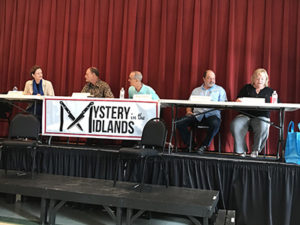Getting Real with Crime Fiction – a Panel Discussion from Mystery in the Midlands
This was the first panel discussion on the schedule for the Mystery in the Midlands conference, happening right after the breakout sessions. The panel consisted of Lynn Hesse, Brian Thiem, Roger Johns, and Paul A. Barra, with Lynn Chandler-Willis moderating. Two of the group are former police officers, one is a lawyer, and one ex-military.
Some of the points they made:
One of the former police officers said, “Heck, yes, I make things up!” He noted that in fiction the detective gets to solve every case and get the girl as well, something that was rarely true in real life. They didn’t solve every case. They generally worked on many cases at a time and some had to be shelved when time and leads ran out. Day to day investigations can be chaotic and random. Fiction imposes structure on events that rarely have any.
All of the panelists acknowledged that events from their jobs, and people met in the course of them, played into the stories they wrote. As one said, “Things—ideas, details—bubble up from life experiences.” An author can’t help bringing what they’ve done and seen into stories.
They don’t base characters directly on people they’ve met in the course of the job, but bits and pieces of their acquaintances may show up in their cast.
Authors often create situations that are too over-the-top. While they certainly had some odd and unusual experiences in their careers, most cases are fairly routine. They did not get involved in shoot-outs with bad guys on a day-to-day basis, or even on a month-to-month or year-to-year basis.
Law enforcement officers are human beings, too. They’re not always perfect. Some are better than others, but all make mistakes.
And finally they mentioned that most of the gritty reality of law enforcement and legal work gets left out of fiction, sometimes to its detriment. More authenticity around the procedures and the paperwork that fill up the day could add richness and depth to many stories.

